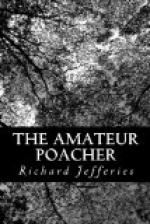Those only know a country who are acquainted with its footpaths. By the roads, indeed, the outside may be seen; but the footpaths go through the heart of the land. There are routes by which mile after mile may be travelled without leaving the sward. So you may pass from village to village; now crossing green meads, now cornfields, over brooks, past woods, through farmyard and rick ‘barken.’ But such tracks are not mapped, and a stranger misses them altogether unless under the guidance of an old inhabitant.
At Sarsen the dusty road enters the more modern part of the village at once, where the broad signs hang from the taverns at the cross-ways and where the loafers steadily gaze at the new comer. The Lower Path, after stile and hedge and elm, and grass that glows with golden buttercups, quietly leaves the side of the double mounds and goes straight through the orchards. There are fewer flowers under the trees, and the grass grows so long and rank that it has already fallen aslant of its own weight. It is choked, too, by masses of clog-weed, that springs up profusely over the site of old foundations; so that here ancient masonry may be hidden under the earth. Indeed, these orchards are a survival from the days when the monks laboured in vineyard and garden, and mayhap even of earlier times. When once a locality has got into the habit of growing a certain crop it continues to produce it for century after century; and thus there are villages famous for apple or pear or cherry, while the district at large is not at all given to such culture.
The trunks of the trees succeed each other in endless ranks, like columns that support the most beautiful roof of pink and white. Here the bloom is rosy, there white prevails: the young green is hidden under the petals that are far more numerous than leaves, or even than leaves will be. Though the path really is in shadow as the branches shut out the sun, yet it seems brighter here than in the open, as if the place were illuminated by a million tiny lamps shedding the softest lustre. The light is reflected and apparently increased by the countless flowers overhead.
The forest of bloom extends acre after acre, and only ceases where hedges divide, to commence again beyond the boundary. A wicket gate, all green with a film of vegetation over the decaying wood, opens under the very eaves of a cottage, and the path goes by the door—across a narrow meadow where deep and broad trenches, green now, show where ancient stews or fishponds existed, and then through a farmyard into a lane. Tall poplars rise on either hand, but there seem to be no houses; they stand, in fact, a field’s breadth back from the lane, and are approached by footpaths that every few yards necessitate a stile in the hedge.
When a low thatched farmhouse does abut upon the way, the blank white wall of the rear part faces the road, and the front door opens on precisely the other side. Hard by is a row of beehives. Though the modern hives are at once more economical and humane, they have not the old associations that cling about the straw domes topped with broken earthenware to shoot off the heavy downfall of a thunderstorm.




